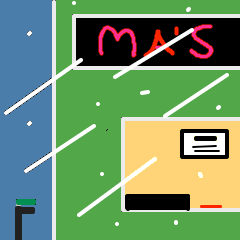“The only way to be sure not to say something stupid is to say nothing. Therefore I shall leave the following page of this work entirely blank, thus ensuring that at least one page of it shall not be utter nonsense.”
Gerry Goldsmith stared at the words he had just typed. Or had he just typed them? How long had he been sitting here staring at this page? How long had it been since he had come up here from Araminta’s flat down on the second floor?
He turned and looked out the window. It was twilight, and the streetlights had come on. Or, if it was morning, then the lights had already been on. Snow fell past and through the girders of the Third Avenue El, something like snow, or was it sleet, or something other than sleet or snow? What time was it? He looked at his watch, his faithful old Hamilton, thank you, Great Aunt Edna, given to him upon his graduation from Andover, lo those many years ago, when he was young and full of – what? Beans? Life? Youth? What was he full of now, if anything? Six-thirty-two said the hands of the watch, the second hand ticking round towards six-thirty-three. Yes, fine, but was it morning or evening? Why didn’t he know whether it was morning or evening? Was it the marijuana he had smoked earlier with Araminta? No, no, it wasn’t that…
Was he dying? Or was he dreaming? Was he going mad? He pushed himself up from his little writing table and stood, swaying slightly back and forth. Why did his feet feel so far away?
His body carried him the few feet to his bed, his narrow bed, and he got into it. He was still wearing his suit and tie, his shoes. It didn’t matter. It took him so long to get the sheet and blankets over him, his two old army blankets, but why was he so cold? Why was he so horribly cold?
Araminta Sauvage smoked the rest of her reefer, listening to the Beethoven quartet on the Philco, and beneath it and around it the sound of the rain outside, and then it occurred to her that she hadn’t seen Gerry Goldsmith since yesterday afternoon. What was the old boy up to? Maybe he would like to go out for a bite to eat over at Ma’s? A perfect afternoon for one of Ma’s lovely grilled cheese sandwiches, with her homemade sourdough bread, and a cup or two or three of her sui generis chicory coffee!
She made sure her beret was on her head, donned her raincoat, took her umbrella out of its vase and, leaving the radio on, she glided out the door without locking it and up the stairs to the sixth floor to Gerry’s door.
She knocked.
“Gerard, ‘tis I, Araminta!”
She knocked again.
“Gerry, old bean, are you in?”
She thought she heard a human vocal noise.
“Gerry, old man, is that you?”
A louder noise, but just slightly louder. Could it be a groan?
She tried the knob, and the door opened.
“Gerry, are you napping?”
A groan, a definite groan.
The lamp on Gerry’s writing table (his only table) was lit.
She went over to the bed. Gerry lay fully clothed under twisted dark green blankets. His normally reddish face was pale, exactly the color of sole meunière before it’s cooked. His eyes were open, and they were bloodshot. To be frank, his eyes were usually bloodshot, but now they were especially so. His chin was covered with brindled whiskers, and they glistened with sweat.
“Gerry, are you ill, old man?”
“Minta,” he said softly.
“Yes, it is I, Araminta. Gerry, why are you lying in bed with all your clothes on?”
“Clothes,” he said, softly.
She reached down and touched his shirt.
“You are absolutely drenched. Gerry, I think you’ve caught a bug!”
“Bug,” he whispered.
She laid the back of her hand against his forehead, and his brow was warm to the touch and wet.
“All right, buddy, first thing we’re going to do is get you out of these soaking things.”
“Things,” he said, apparently trying to speak above a whisper, and failing.
“Don’t try to talk. But I’m going to get you out of these soaking wet clothes. Then I am going to get you some aspirins, and I’m going to make you a nice cup of tea. Would you like some tea?”
“Tea?”
“Yes, tea. Tea is the great restorative liquid. And aspirins of course. Now let me pull you up into a sitting position so I can undress you, but don’t get the wrong idea, ha ha.”
“Idea.”
“Yes, don’t get the wrong one.”
“Wrong one…”
Poor Gerry. What if he died? No, she mustn’t let him die. Poor fellow.
With great difficulty she got all of his clothes off him, even his underwear, trying but alas not succeeding not to look at him, and then she got him back under the covers. She touched his forehead. It actually felt normal now, maybe just a trifle cool. Perhaps he would live after all.
“Now, Gerard, just you lie there, and I’m going to get you those aspirins and I’l also bring up a nice hot pot of lapsang. Wouldn’t that be nice.”
“Yes, nice.”
“Just lie here and I’ll be back in a jif.”
She got up from the side of the bed where she was sitting, and on the way out she stopped at his writing table and read what was in the platen of Gerry’s old Royal portable:
“The only way to be sure not to say something stupid is to say nothing. Therefore I shall leave the following page of this work entirely blank, thus ensuring that at least one page of it shall not be utter nonsense.”
Well, it wouldn’t be the last nonsense Gerry wrote if Araminta had any say in the matter, and she went to the door, opened it, and went out. Her grilled cheese would have to wait, but after she made some lapsang and got Gerry to drink some of it, she knew what she would do, she would run down to Ma’s and tell Ma that Gerry was under the weather and could she have a nice big bowl of Ma’s chicken noodle soup in a container to take up to the poor man. Some aspirins, some lapsang, some of Ma’s soup…
No, Mr. Gerard “Gerry” (“the Brain”) Goldsmith wasn’t going to not write another page of nonsense if Miss Araminta Sauvage had anything to do with it!
{Kindly go here to read the “adult comix” version in A Flophouse Is Not a Home, profusely illustrated by the illustrious rhoda penmarq…}





